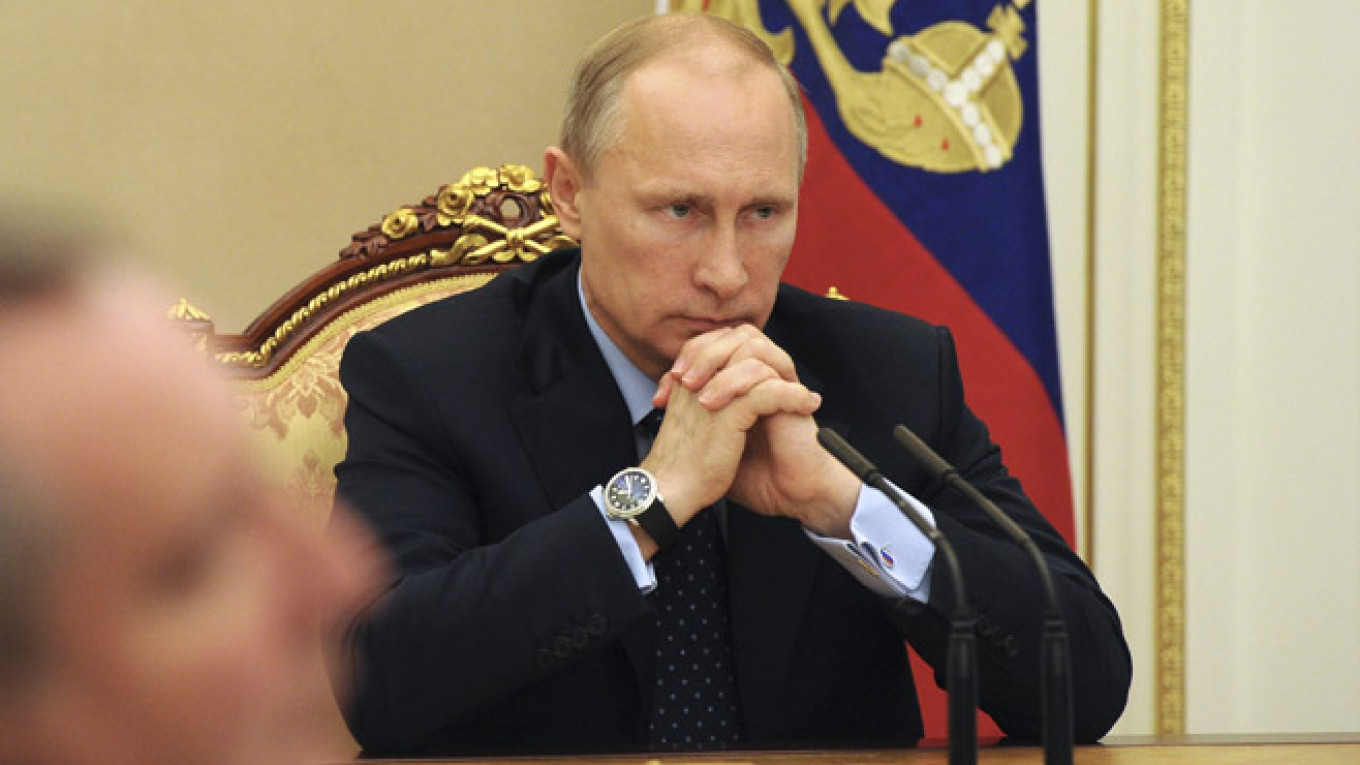Уконтрапупить: (slang) to kill, beat, destroy, etc.
Not much makes me laugh these days, but President Vladimir Putin's use of the word уконтрапупить did. He used it while speaking about the sanctions levied by the West against Russia: Пока все санкции сводятся к тому, чтобы выбрать из моего личного окружения близких мне людей, моих друзей, и их, как у нас в кругах интеллигенции говорят, 'уконтрапупить' как следует, наказать их непонятно за что (So far all the sanctions come down to choosing people close to me in my inner circle, choosing my friends, and, as they say in the intelligentsia, making short shrift of them — punishing them for something I don't know).
The word rang a dim bell in my head, and I eventually found the last time Putin used it. Back in 2011, he said, "Желание попасть на волну и понравиться, и кого-то уконтрапупить, схватить и посадить во что бы то ни стало, показать свою крутизну — это самое простое, что мог бы сделать человек в моём положении" (The desire to catch the wave and have people like you, destroy someone, grab someone and stick him in jail no matter what, show off what a tough guy you are — that is the easiest thing for someone in my position to do).
Now, not being in that position of power, I cannot say what is easy to do. I was more interested in the tough guy image, and with the second appearance of уконтрапупить (also spelled уконтропупить) I decided to do a bit of linguistic investigation.
No one seems to know the origin of the word, but since it first appeared in the 1920s — actually, in 1926 in works by two great writers, Vladimir Mayakovsky and Mikhail Zoshchenko — etymologists think it was related to the various slang words for оппози — er, контрреволюционеры (counter-revolutionaries), like контрики — which I would like to translate as contras but cannot, given the associations with re=cent American history and scandal. Let's call them "counters" instead.
In any case, since оппо-, er, counter-revolution was perceived as a great threat to the new Soviet regime, it makes sense that there would be a slang word for bashing the counter-revolutionaries, which then morphed into meaning "destroy someone as one would a counter-revolutionary."
What I cannot tell is if the word was a comical then as it is now. Пуп is a belly button, and perhaps not inherently funny, but пуп in words generally brings a smile. I don't know why, but poop is pretty funny in English, too.
Maykovsky used the imperfective version of the word in a poem called Хулиган (The Hooligan): Не нас контрапупят (We aren't being trashed!), but Zoshchenko used the perfective in a short story about a rabid dog, "Где тут, — кричит, — ребятишки, бешеная собака? Сейчас мы её уконтрапупим!" ("Where," he cries," is that rabid dog, kids? We'll finish him off"). And then singer-songerwriter Vladimir Vysotsky used it in a song about the Chinese: Чем ещё уконтрапупишь / Мировую атмосферу: / Мы покажем крупный кукиш / США и ССРу! (How else can we wreck / the mood in the world? / We'll flip the bird/ to the U.S.A. and U.S.S.R.!)
But it is not only a word for the intelligentsia. Someone might say: Была серия новоселий, которая нас уконтрапупила вконец (There was a series of housewarming parties that eventually did us in).
They became party poopers?
Michele A. Berdy, a Moscow-based translator and interpreter, is author of "The Russian Word's Worth" (Glas), a collection of her columns.
A Message from The Moscow Times:
Dear readers,
We are facing unprecedented challenges. Russia's Prosecutor General's Office has designated The Moscow Times as an "undesirable" organization, criminalizing our work and putting our staff at risk of prosecution. This follows our earlier unjust labeling as a "foreign agent."
These actions are direct attempts to silence independent journalism in Russia. The authorities claim our work "discredits the decisions of the Russian leadership." We see things differently: we strive to provide accurate, unbiased reporting on Russia.
We, the journalists of The Moscow Times, refuse to be silenced. But to continue our work, we need your help.
Your support, no matter how small, makes a world of difference. If you can, please support us monthly starting from just $2. It's quick to set up, and every contribution makes a significant impact.
By supporting The Moscow Times, you're defending open, independent journalism in the face of repression. Thank you for standing with us.
Remind me later.








